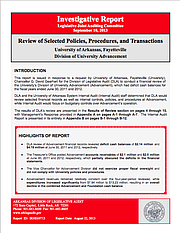The duties of the new in-house financial planner hired at the University of Arkansas at Fayetteville will go hand in hand with what the campus plans to do in response to a legislative audit of its deficit-troubled fundraising arm, according to campus officials. Plans include having units across campus submit monthly, in depth financial reports by December.
During the first week of September, UA acknowledged that it had created a new position - associate vice chancellor for budget and financial planning - and had interviewed four finalists for it during the last two weeks of August.On Monday, UA announced that it had selected Timothy J. O’Donnell, a utilities financial executive, to fill the job beginning Oct. 7.
UA’s finance chief Don Pederson said earlier this month that the idea for creating the position preceded by several years the UA Advancement Division’s 2012 budget deficit, but the deficit moved UA officials to action.
“Mr. O’Donnell will be working on implementing ‘full budget control’ and will be working with the unit fiscal officers,” Pederson said by email Tuesday in response to questions about how audit recommendations will dovetail with the duties of the new financial planner.
Full budget control is “a joint effort between the units and central administration to monitor budgets, including all revenue, and do so monthly,” said Pederson, UA vice chancellor for Finance and Administration.
On Sept. 10, the state Legislative Audit Division and the University of Arkansas System’s internal auditors released separate but simultaneous audits of the Advancement Division’s finances. Among other things, they found that the division had a $2.1 million deficit at the end of fiscal 2011 that grew to $4.2 mil-lion by the end of fiscal 2012. The Advancement unit typically had about $10 million in annual revenue from public and private sources, but overspent that amount.
The former Vice Chancellor for the Advancement Division Brad Choate and his budget officer Joy Sharp were dismissed after the deficit was discovered in 2012 but were allowed to work through June 30, the end of the fiscal year. An internal report and the audits found that Sharp gave inadequate and inaccurate budget information and that Chaote didn’t exercise proper fiscal oversight of the division.
Legislators grilled UA officials, including Pederson, about UA accounting and budgeting practices at a meeting Friday, insisting that UA adopt financial accounting changes recommended in the audit.
Pederson, UA Chancellor G. David Gearhart and UA treasurer Jean Schook argued that some items highlighted in the audits amounted to differences of opinion on accounting methods, but Schook and the UA’s official response to the audits was that UA would institute the recommended changes.
CHANGES PLANNED
The UA System audit said the monitoring of budgets varies widely across the Fayetteville campus.
The legislative audit noted that the Advancement Division did not budget, nor account for direct payments to vendors through the private UA Foundation, despite that these payments totaled $7.84 million in the division’s spending from fiscal 2010 through fiscal 2012.
Legislative auditors recommended that financial reports include all revenue and expenditures from public and private funds. UA administrators responded that the campus was developing processes “to improve oversight of unit financial performance by Finance and Administration with the establishment of a formal reporting structure for campus financial officers” and tracking of public and private sources in BASIS, UA’s financial software.
The UA response continued: “The university is also currently developing a financial report to be used by all campus units that will provide comprehensive reporting of financial position monthly, which is expected to be introduced by December 2013. As an interim step, academic units began submitting monthly financial reports to the provost and [vice chancellor for Finance and Administration] beginning in January 2013.”
Legislative auditors’ found that the Advancement unit’s revenue remained relatively constant from fiscal 2008-12,the period reviewed, but its expenditures increased from $7.94 million to $13.23 million. A UA treasurer’s report said that was driven primarily by the hiring of employees without an assurance that there was money to pay for those positions.
Auditors said UA must not implement new employee positions in the Advancement unit until it receives “written documentation and a revenue source to cover personnel costs.” UA officials responded that the BASIS system is capable of tracking all anticipated revenue and expenditures.
“However, use of this feature by the campus has been optional up to this time,” the UA response continued. During fiscal 2014, campus finance officers will be strongly encouraged to use this feature, and by fiscal 2015, its use will be mandatory, the response said.
“Managers responsible for hiring approval will be instructed that approval for all positions shall only be granted when the source of salary funding is entered in the BASIS system and is expected to be available.”
BUDGETING SWITCH
On Tuesday, Pederson said O’Donnell will be involved in training budget officers and will “sort out the issues” of implementing full tracking of revenue and expenditures in the BASIS system.
The Fayetteville campus currently uses a traditional budget model known as “incremental budgeting,” in which a unit’s budget begins at the previous year’s funding level and increases incrementally rather than on the basis of performance. According to hanoverresearch.com, a good thing about incremental funding is its predictability in allowing universities to plan ahead for multiple years.
But the website describes its drawbacks: “This model is limited in its vision, as it is difficult to determine where costs have been incurred and how these costs contribute to revenue and value creation.”
In a 2006 study of UA’s budgeting model, Doyle Z. Williams, former dean of the Sam M. Walton College of Business, wrote that with the traditional model: “Executive management must deal with surpluses or deficits created during the fiscal year.”
O’Donnell’s annual salary will be $150,000, all paid with public funds, said UA spokesman Steve Voorhies.
Earlier this month, UA’s human resources chief Barbara Abercrombie said the new position’s salary would be “competitive,” and that the legislative line-item maximum for a similar position was $131,334.
Front Section, Pages 1 on 09/18/2013


